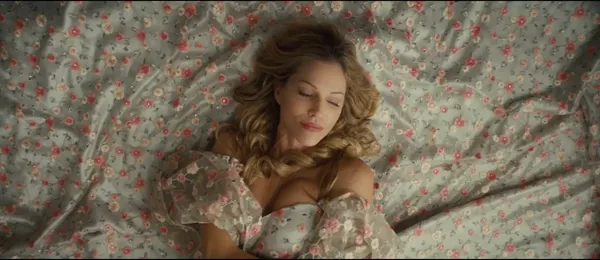Eye For Film >> Movies >> Hello Beautiful (2025) Film Review
Hello Beautiful
Reviewed by: Jennie Kermode

Every year, around 370,000 US women are diagnosed with breast cancer. In recent years, the rate of diagnosis has been rising, especially among younger women, though at the same time the rate of death from the disease has fallen, with treatments becoming more and more effective. Going through treatment is still a traumatic process, and whilst the disease often runs in families, allowing some opportunity to prepare for the prospect of diagnosis, for others the whole experience comes completely out of the blue, abruptly changing every aspect of life.
From the moment we meet Willow (Tricia Helfer), it’s apparent that she’s used to having her own way. Airport announcements referencing Paris, Vienna and Boston hint at the international scope of her career as we see her modelling glamorous dresses: a sweeping scarlet number which emphasises her cleavage; a bridal gown; and a cutesy floral frock whose print matches the bed upon which she is photographed. Between them they make it clear how the world understands her value, which is perhaps not so far from how she sees it herself. “It was a warm day in December when I decided to kill myself,” she says.

It’s often the little things that get to people. Fear of pain or the loss of one’s looks – not much when mortality is in the balance, but it takes Willow a while to be fully capable of understanding that. Everything indicates that she has lived a very privileged life. Her ego is at least as much a barrier to her happiness as the cancer. Following careless remarks by her friends about men leaving their wives after diagnosis, she centres her panic on the idea that she might lose her husband, Khalil (Tarek Bishara). This leads her to create problems in their relationship which might not have emerged otherwise.
Family discord is exacerbated by the already troubled relationship between Willow and Khalil’s mother (Susan Shalhoub Larkin), who disapproves of her career and worries that she’s not devoting enough attention to her children. The youngest of these, Alex (Liam Anderson), seems pretty well adjusted, all things considered, and doesn’t get all that much narrative attention. The 15-year-old, Isabel (Sara Boustany), is wearing black, hanging out with the wrong crowd (tm) and taking cocaine. Willow’s treatment of her boyfriend gives the impression that we’re still in the 1950s, and the later development of that character all the more so, whilst the girl is robbed of agency at every turn.
The story is based on specific real events (as recounted, with fictional polish, in Christine Handy’s Walk Beside Me), but many people will have experienced something like it, and will relate to the awkwardness of those moments when doctors ask one to come in before they will discuss a result – as if that were not, in itself, revealing the result – or use teem like ‘aggressive’ when describing treatment without providing any further detail. A test just before a weekend leaves Willow with a prolonged period in which to panic, and she also has the unpleasant attitudes of strangers to deal with. That said, she’s often quite unpleasant herself, as are her wealthy white friends, who have real trouble accepting the authority of a working class Black woman when spending time on the day ward with her.
Money makes a difference to most things, and that’s very much the case here. There’s no suggestion that the family will struggle financially because of Willow’s illness; health insurance isn’t even discussed. Their vast house and chauffeur-driven limo give her a level of comfort and privacy most cancer patients can only dream of, and yet at every stage, Willow complains, as if she’s simply incapable of noticing that other patients also suffer. This makes it difficult for the film to sell the unpleasantness of what she actually is experiencing, as she throws up delicately into a bin or swoons onto soft surfaces. As a result, it’s not nearly as tough a watch as most films on this theme. Its coating of sugar helps the medicine go down, if you will, and it becomes a very safe means whereby viewers might start exploring their own emotions around the subject.
In case you’re not sure how you feel on watching it, don’t worry – Marco Werba’s giant size score will be sure to tell you. Together with some awful dialogue – a highlight is “Every time you tear down Isabel you’re actually killing a part of yourself in Khalil’s heart” – it drags this into soap opera territory. A bigger problem, however, is that it’s never really clear that this film is trying to achieve. There are any number of tragic cancer tales out there already. What did co-writer/director Ziad H Hamzeh hope to bring to the table? That, at least, provides an element of mystery in a film which otherwise does everything by the numbers.
Reviewed on: 21 Apr 2025
















